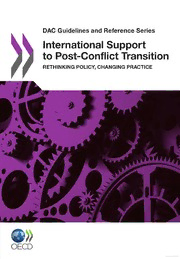
International support to post-conflict transition [electronic resource] : rethinking policy, changing practice PDF
Preview International support to post-conflict transition [electronic resource] : rethinking policy, changing practice
DACGuidelinesandReferenceSeries International Support to Post-Conflict Transition RETHINKINGPOLICY,CHANGINGPRACTICE OECD Copyrightedmaterial Copyrightedmaterial DACGuidelinesandReferenceSeries International Support to Post-Conflict Transition RETHINKINGPOLICY,CHANGINGPRACTICE OECD ThisworkispublishedontheresponsibilityoftheSecretary-GeneraloftheOECD. Theopinionsexpressedandargumentsemployedhereindonotnecessarilyreflect theofficialviewsoftheOrganisationorofthegovernmentsofitsmembercountries. Thisdocumentandanymapincludedhereinarewithoutprejudicetothestatusof orsovereigntyoveranyterritory,tothedelimitationofinternationalfrontiersand boundariesandtothenameofanyterritory,cityorarea. Pleasecitethispublicationas: OECD(2012),InternationalSupporttoPost-ConflictTYansition:RethinkingPolicy,ChangingPractice, DACGuidelinesandReferenceSeries,OECDPublishing. http://dx.doi.org/10.1787/9789264168336-en ISBN978-92-64-16831-2(print) ISBN978-92-64-16833-6(PDF) Series:DACGuidelinesandReferenceSeries ISSN1990-0996(print) ISSN1990-0988(online) Photocredits:Cover©KonstantinInozemtsev/istockphoto.com. CorrigendatoOECDpublicationsmaybefoundonlineat:www.oecd.org/publishing/corrigenda. ©OECD2012 YAptlueolbaulcrihceciaaqntnugieocsmnoatspts,ye,rfdioadartolaswpb,unablpsloreioascvdaiodrnoerdcdpmortumihlmnattetirOsmcuEeiidCtaiaDlbalcueposraneotcdeakunnnctdotswftloirrenadynygosoeuluarmrteioonowwtnnnorfiudgsOohecE,tuCsmaDsenhndaotsyussol,oduuprrbcceeaesnesaniutnnbadcmtliicuootdnptesye,rdeibxglcthooetgrsrpo,[email protected].. Requestsforpermissiontophotocopyportionsofthismaterialforpublicorcommercialuseshallbeaddressed directlytotheCopyrightClearanceCenter(CCC)[email protected]^aisd’exploitationdu droitdecopie(CFC)[email protected]. FOREWORD Foreword ^^ECDmembercountriesprovidedUSD46.7billioninofficialdevelopment assistancetofragilestatesin2009.Thisisasignificantinvestment,butwestill struggletoworkwithourpartnersinwaysthatsupporttransformativeresults infragilestates.Thefactthatnolow-incomefragilestatehasyetachieveda singleMillenniumDevelopmentGoal(MDG)isastarkreminderbothofthe needsthatdriveallsidestofocusonfragility,andofthedauntingchallenges thatremain. Evidenceshowsthateffectivesupporttotransitionrequirescollective andparallelengagementbydifferentpolicycommunities.Despitedecades ofexperience,wehavestillnotbeenabletobuildaresponsethateffectively linkshumanitariananddevelopmentassistance,andthatreconcilesdifferent principlesandoperationalmodalitiesinawaythatsupportstransitionsfrom conflicttopeace.Achangeinbothpolicyandpracticeisneeded. FromAfghanistantoHaiti,andmostrecentlyintheHornofAfrica,we havewitnessedtheresultsofdevelopmentapproachesthatarenotdesignedto meetthechallengesoffragilestatesinatimelyandflexiblemanner.Weknow thatinmanyofthesecountries,unrealisticexpectationsaboutcapacitiesand ownershipfrequentlycausedelaysindevelopmentassistance.Intheabsence ofbetterdevelopmentfunding,humanitarianactorshavebeenlefttofillthe void;yethumanitarianinstrumentsareneitherdesignednorwell-equippedto promotepeacebuildingandstatebuilding.This,inturn,hasanegativeimpact ontheprospectsofasuccessfultransition. Ifweknowallthis,whyhassolittlechanged?Someoftheproblemmight havetodowithcurrentapproachestomanagingrisks.Transitionsarehigh-risk teahnnevdirfriosorknstmhoeefntniosnttfeoerrnndgaeatigvoiennlagolpicmneotnmhtmesuiennviceotsnyttme—extnsotus—tawnbeoditgahhctfitoohrnet,hryeiestckomsuoonrftereionefgstaetgnhietnmghsaiennlnvtoehtse, firstplace.Thequestion,therefore,isnotwhethertoengage,buthowtoengage inwaysthatarecontext-specificanddonotcomeatanunacceptablecost. TheFourthHigh-LevelForumonAidEffectivenessinBusan(2011)was awatershedmomentforinternationaldevelopmentco-operation.Morethan 40fragilestatesanddevelopmentpartnerscametogethertoendorseaNew INTERNATIONALSUPPORTTOPOST-CONFLICTTRANSITION:RETHINKINGPOLICY,CHANGINGPRACTICE©OECD2012 3 FOREWORD DealforEngagementinFragileStates,whichgivesclarityonprioritiesinthese difficultcontextsbysettingoutaroadmapforbetteruseofbothinternational anddomesticresources.Builtonasetofagreedpeacebuildingandstatebuild- ingobjectives,theNewDealalsorecognisestheneedforfocussedapproaches thatsupportcountry-ledtransitionsoutoffragility,andforacceptingtherisks ofengagementwithfragilecountries.DevelopedbytheDACInternational NetworkonConflictandFragility(INCAF),InternationalSupporttoPost-Conflict Transitionprovidestheguidancethatdevelopmentpartnersneedtomakegood onthecommitmentstheymadeatBusan. Toensurethatdevelopmentresourcesareusedtosupporttheessential objectivesofpeacebuildingandstatebuilding,weneedtobridgethedividebe- tweenpolicyandpracticetodelivermorerapid,flexibleandrisk-tolerantsup- port.Andbecausethevastlydiversecontextsfromonecountrytoanothercan turnblueprintapproachesintorecipesfordisaster,wecannotaffordtotake a“one-size-fits-all”approach.Withthesechallengesinmind,thisguidance callsforsupportfocussedonpeacebuildingandstatebuildingtoenabledonors todeliverbetterresultstothosewhoneeditmost.Thesuggestionsraisedin thisimportantpublicationmeritin-depthdiscussionbyallconcerneddevel- opmentpartnersandwillnodoubtcontributetoshapingthediscussionabout howtoimprovedeliveryinpost-conflicttransitions. (fm GunillaCarlsson Chair,OECDDevelopment MinisterforInternational AssistanceCommittee DevelopmentCo-operation, MinistryforForeignAffairs,Sweden 4 INTERNATIONALSUPPORTTOPOST-CONFLICTTRANSITION:RETHINKINGPOLICY,CHANGINGPRACTICE©OECD2012 ACKNOWLEDGEMENTS Acknowledgements Thi,publicationhasbeenpreparedattherequestoftheOECDDevelopment AssistanceCommittee(DAC)andtheUNSecretary-General.Theprocessof developingandpreparingtheguidancewasledbyAsbjornWee(OECD-DAC Secretariat)undertheoverallguidanceofHenrikHammargren(Sweden, ChairoftheDACInternationalNetworkonConflictandFragilityTaskTeam onFinancingandAidArchitecture)andAlexandraTrzeciak-Duval(OECD- DACSecretariat).RahulChandran,SarahCliffe,JamesDarcy,ChristianLotz, StephanMassing,LeighMitchell,NicolaPontara,SanjanaQuazi,NigelRoberts, RachelScott,JakeSherman,MariskavanBeijnum,BrianJ.Williams,Ronald Wormgoor,VanessaWyethandGeorginaYatescontributedtotheanalysis andkeypolicyrecommendations. Thepublicationhascomeastheresultofacollaborativeeffortbetween membersoftheDACInternationalNetworkonConflictandFragility(INCAF). TheINCAFCo-chairs,KoenDavidse(Netherlands),TobiasNussbaum(Canada) andJordanRyan(UnitedNationsDevelopmentProgramme,UNDP)facilitated theprocessbyorganisinghigh-levelconsultationswithmultilateralactors inNewYork,andwereinstrumentalingettingthedocumentapproved.Col- leaguesandTaskTeammembersfromthefollowingcountriesandorganisa- tionsprovidedvaluablecommentsandcontributionsthroughouttheprepa- rationprocess,including:Australia(JaneChandler,MatKimberley,Lyndal Manson,ArthiPathel,NatashaSmith),Belgium(MartinusDesmet,XavierRou- ha),Canada(MichaelKoros,HeXiang),Denmark(MetteStrandGjerloff,Tania Schimmell),Finland(SatuLassila),France(FrancoisGaulme,ValerieMaugy, MathieuRobin),Germany(SabineBrickenkamp,SophieKraume,HenningPlate, ChristineToetzke),Ireland(CiaraO’Brien),Japan(AiImai,MotoyukiIshize, RyutaroMurotani),Netherlands(KoenDavidse,RonaldWormgoor),Norway (TomEdvardEriksen,ElisabethSchwabeHansen),Portugal(ManuelaFerreira), Sweden(KarinAndersson,JohanFrisell,UlricaReuterwall),Switzerland(Sego- leneAdam),UnitedKingdom(MarcusLenzen,RebeccaDale,GeorginaYates, BellaBird,SueLane,KateWhyte),UnitedStates(NanceKyloh,NeilLevine, RachelLocke,GaryWinter),EuropeanCommission(FedericoBirocchi,Oliver Blake,BronteFlecker,AgataNieboj,CorradoScognamillo,DorotheeStarck),In- ternationalMonetaryFund(DominiqueDesruelle,BhaswarMukhopadhyay), INTERNATIONALSUPPORTTOPOST-CONFLICTTRANSITION:RETHINKINGPOLICY,CHANGINGPRACTICE©OECD2012 5 ACKNOWLEDGEMENTS OECD(SaraFyson,DonataGarrasi,ErwinvanVeen),UNDP(PeterBatchelor, BrunoLemarquis,ChristianLotz,StanNkwainJenniferWorrell),UNOffice fortheCo-ordinationofHumanitarianAffairs(OCHA)(MichaelJensen,Steve O’Malley,SanjanaQuazi),UNPeacebuildingSupportOffice(PBSO)(BrianJ.Wil- liams,KristinaKoch-Avan,CalumGardner)andtheWorldBank(AlastairMck- echnie,NicolaPontara,GregEllis,SteveNdegwa,FarisHadad-Zervos). Inaddition,thedevelopmentofthisguidancebenefittedfromfrequentin- teractionandfeedbackfrommembersoftheUNDevelopmentGroup(UNDG) ExecutiveCommitteeonHumanitarianAffairs(ECHA)WorkingGroupon Transition,including:SandraAviles,AnjaBilleBahncke,DeniseBrown,Isabel Candela,SofiaCarrondo,LisaDoughten,HenrietteKeijzersandNalineeNip- pita,RachelDoreWeeks,BettinaWollandGeorgeZachariah.Severalroundsof consultationswerealsoorganisedtosolicitfeedbackandfurthersharpenthe recommendations,includingahigh-levelconsultationwithheadsofUNagen- ciesandprogrammes,withtheWorldBank,withmemberstheInter-agency SteeringCommittee,andwiththeEuropeanCommission.Valuablefeedback ontheoperationalaspectsoftheguidancewasprovidedbyGiovanniBosco, JeanneBriggs,NickCrawford,FionaDavies,PhilipDive,StefDeutekom,Lise Grande,MathewLeslie,DanielLopez-Acuna,JamesC.Lovelace,JonasMfoua- tie,AdrianMorris,JoannaNickollsandOliverUlich. JamesEberleinandFionaHallprovidedinvaluableeditorialassistance andStephanieCoicandIsabelHubercontributedtothepreparationofthis publication. 6 INTERNATIONALSUPPORTTOPOST-CONFLICTTRANSITION:RETHINKINGPOLICY,CHANGINGPRACTICE©OECD2012 TABLEOFCONTENTS TableofContents Abbreviationsandacronyms 9 Executivesummary 11 Introduction 15 1.Theneedforchangeinacontextofrisk 17 Whatarethechallengesduringtransition? 18 WWhhaytisartehethientreirsnkastfioornadloncoormsmiunntirtanysintoitomneceotnitnexgttsh?esechallenges?..2129 Recommendations:Strategiesfordealingwithrisk 27 2.Coherentplanningandprioritisation 31 Whataretheprioritiesfortransitionsupport? 32 Whatislimitingeffectiveplanningandclearprioritisation? 35 Recommendations:Helpinggovernmentsprioritisetheirdevelopment...39 3.Gettingthemixofaidinstrumentsright 45 Whyisamixofaidinstrumentsrequired? 46 Whatcategoriesofaidandassociatedinstrumentsareavailable?....46 Guidingprinciplesforchoosingtherightmix 51 Recommendations:Puttingtogetheraneffectivefinancingstrategy 57 4.Awayforward:transitioncompacts 65 Canmutualaccountabilityworkintransition? 66 Thefourelementsofatransitioncompact 67 Lessonsfromrecentexperienceswithcompacts 71 Recommendations:Makingtransitioncompactshappen 75 AnnexA.KeyelementsofareformagendatoimplementtheDACGuidance onTransitionFinancing 81 Bibliography 83 INTERNATIONALSUPPORTTOPOST-CONFLICTTRANSITION:RETHINKINGPOLICY,CHANGINGPRACTICE©OECD2012 7 TABLEOFCONTENTS Tables 3.1. Effectivenesscriteriaforchoosingaidinstrumentsduringtransition.54 3.2. Optionsforamoreefficientdivisionoflabouracrossdifferentglobal transitionfundingmechanisms 61 4.1 Transitioncompacts:roles,benefits,contributionsandactions 79 Figures 1.1. Conceptualframeworkforunderstandingrisks 25 2.1. Broadcategoriesoftransitionpriorities 34 4.1. Elementsoftransitioncompacts 68 Boxes 1.1. Whatdowemeanbytransitionandtransitionfinancing? 18 1.2. Challengesandopportunitiesofdifferentprinciplesforengagement..23 1.3. Pooledfunds,fiduciaryrisksandthelimitsofeffectiveness 29 2.1. Internationalagreementsontransitionobjectivesandpriorities 33 2.2. Internationalplanningtoolsandtheirusefulnessduringtransition...37 2.3. TransitionplanninginTimor-Leste,2008-11 41 2.4. SierraLeone:DonoralignmentwiththeAgendaforChange 42 3.1. Usingpooledfundsintransitionsituations:Secretsofsuccess 49 43..23..Understandingbudgetaid 52 3.3. Dualaccountability:GEMAPinLiberia 55 3.4. Casestudy:SequencingaidinAfghanistan 56 3.5. PracticaloptionstoimproveUN-WorldBankrelationships 62 4.1. Aidinformationmanagementsystemsintransition 69 4.2 Learningfromthe“firstgeneration”ofcompacts 74 Managingtransitioncompacts 77 8 INTERNATIONALSUPPORTTOPOST-CONFLICTTRANSITION:RETHINKINGPOLICY.CHANGINGPRACTICE©OECD2012
